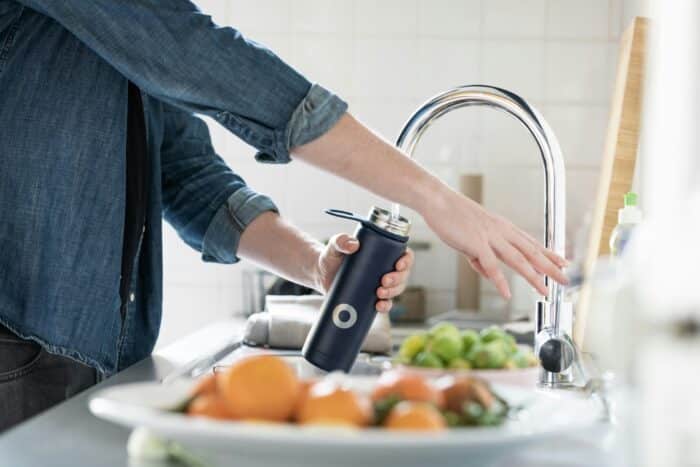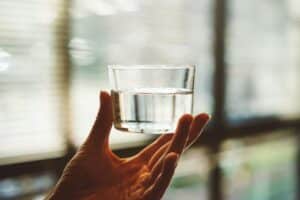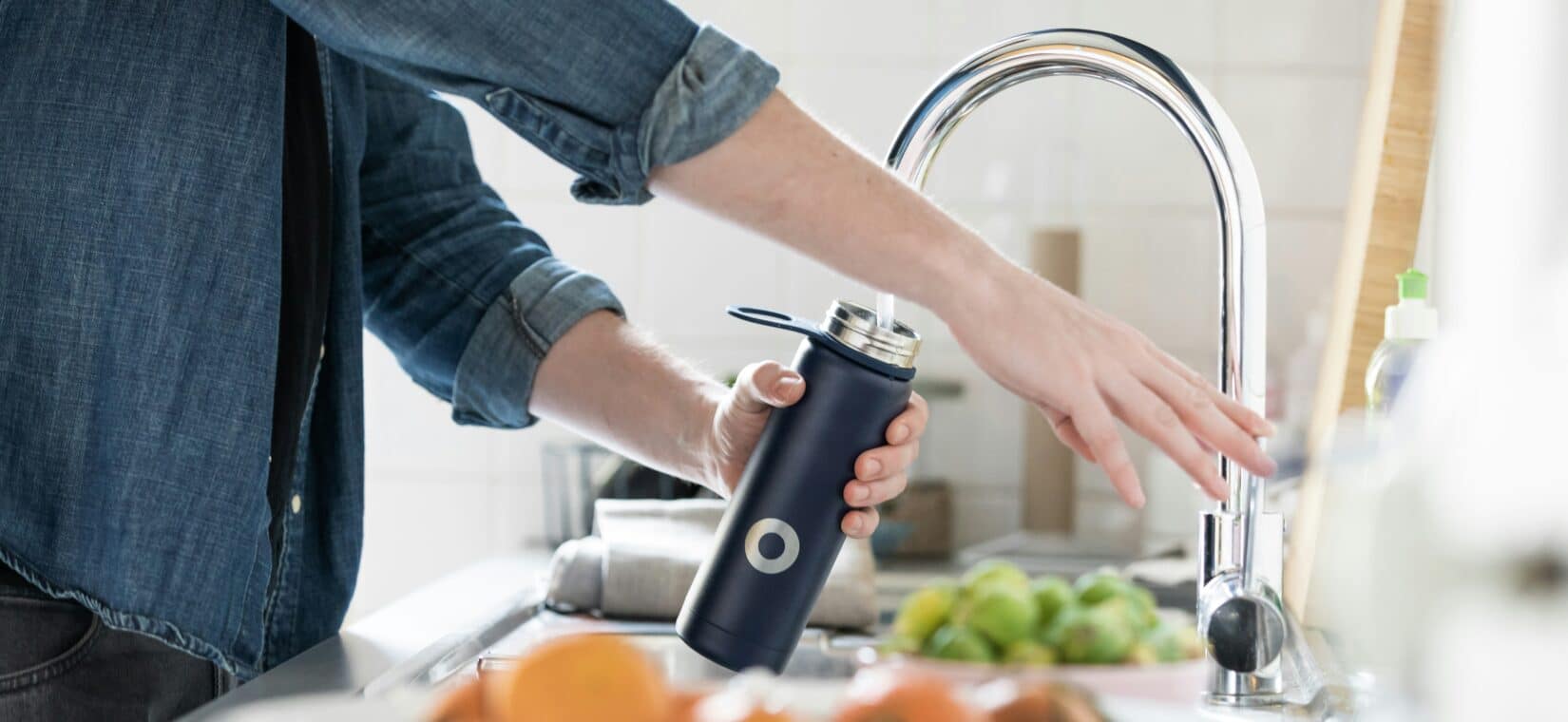The best thing you do for your health today could be as simple as finishing a glass of water.
Water makes up most of your body weight, and virtually every part of the body relies on it to function properly. From digestion to regulating body temperature, water is essential.
In a survival situation, a human can go over a week without food, but only about 3 days without water. In the absence of water, critical processes start to break down.
And it’s not just important for body function. Historically, many cultures have recognized water’s significance by centering it in religious and spiritual traditions. For some, it’s considered sacred and has even granted the same rights as a person. In short, water is life.
But when it comes to your health, hydration is more than just drinking 8 glasses per day. Get the facts below, and learn how to hydrate your body the way it truly needs.
The Science of Hydration

Water is vital to every system in the body, and the science of hydration goes far beyond simply quenching thirst. The human body is approximately 60% water, and nearly every biological process depends on it. From regulating temperature to distributing nutrients, water plays an essential role in keeping us alive and maintaining overall health.
Proper hydration impacts everything from brain function to digestion, and even mild dehydration can lead to both short-term discomfort and long-term health complications. We’re constantly losing water through everyday activities like sweating, breathing, and going to the bathroom, and replenishing those stores is how we maintain balance and prevent dehydration.
Below, we break down how water supports key processes in the body and why staying hydrated is one of the simplest yet most powerful health practices.
Here’s a closer look at how water supports essential processes:
- Regulates body temperature and releases excess heat through sweat
- Flushes toxins and waste products out of cells
- Aids digestion by creating saliva and making food easier to break down
- Dissolves nutrients from food and distributes them throughout the body
- Binds to waste and sweeps it out of the intestines, helping prevent constipation and diverticulitis
- Improves blood oxygenation, which enhances energy and organ function
- Lubricates and cushions joints, tissues, and the spinal cord so we can move safely
- Enables optimal brain function and may reduce anxiety and other negative emotions
- Aids in weight loss
- Helps prevent kidney stones from forming (although if kidney stones do form, a fun fact: This 2016 study and anecdotal evidence show that riding in the back row of a roller coaster may actually help you pass kidney stones!)
While there are many ways to dehydrate, including through perspiration, respiration, urination, and defecation, there’s really only one way to re-hydrate: by consuming water (or by intravenous fluids, although these are not medically necessary for most of us).
Understanding the science of hydration reveals just how critical water is to our health. From cellular function to mental clarity, water is at the center of nearly every process that keeps us feeling and performing at our best. Ensuring that we stay hydrated isn’t just about avoiding thirst—it’s about maintaining the balance our bodies need to thrive.
Dehydration: Signs and Health Impacts
Now that we know how the body uses water, let’s talk about what happens when it doesn’t have enough to carry out its vital functions.
Dehydration can range from mild to severe, with symptoms progressing as the body continues to lose water. Mild dehydration is common and can often be addressed by simply drinking more fluids. As dehydration becomes more advanced, it can lead to serious health consequences.
It’s important to recognize the early signs of dehydration and understand when it may become a medical emergency.
Signs of mild dehydration:
- Feeling thirsty
- Dry mouth
- Headache
- Dark-colored urine (color doesn’t tell the whole story, but it’s a good starting point)
- Muscle cramps
Signs of severe dehydration that require medical attention:
- Confusion
- Light-headedness or fainting
- Inability to urinate
- Rapid heartbeat and breathing
- Decreased blood pressure
- Hyperthermia (abnormally high body temperature)
- Seizures
When dehydration escalates to severe levels, the body’s ability to regulate vital processes is compromised, and medical intervention may be necessary. In these cases, intravenous fluids are often required to restore the body’s fluid balance.
Recognizing the signs of dehydration early can prevent serious health risks and empower you to stay hydrated and keep your body functioning optimally. Keep reading to learn a bit more about your own body’s water needs.
How Much Water Should You Drink In A Day?
You’ve probably heard the common recommendation to drink 8 glasses of water per day. While that’s a reasonable general goal, proper hydration is more personal and complex. Several factors determine how much water your unique body needs to stay hydrated.
Key Factors That Influence Hydration Needs:
- Sex, weight, and height: Bigger/taller bodies need more water to function than smaller bodies do, and males tend to need more water than females do.
- Age: As you age, the ability to sense thirst can diminish, increasing the risk of dehydration.
- How active you are: Frequent exercise and a more active lifestyle increase your body’s hydration needs.
- Your overall health: Conditions such as diabetes, chronic kidney diseases, diarrhea, vomiting, or fever can dehydrate you faster. Pregnancy and breastfeeding can also increase hydration needs.
- The climate where you live: Living in a hot or humid climate where you sweat more may increase your need for water.
- The food you eat: Diets full of water-rich foods like fruit, vegetables, and soups provide additional hydration, whereas diets full of grains, meats, and other dry foods may not.
Wondering if you’re drinking enough water? A good initial indicator (though not a foolproof one) is the color of your pee: Light yellow urine tends to mean you’re well-hydrated, while bright or darker yellow may mean you need more water. Feeling thirsty is also an early sign that you are mildly dehydrated. Try carrying a water bottle with you so that you can sip throughout the day and maintain your hydration.
Still unsure? These recommendations may be a good baseline:
Water Consumption Guidelines:
- Female: Aim for ~9-11 cups of water per day (more if you’re pregnant/breastfeeding)
- Male: Aim for ~13-15 cups of water per day
- Children: Varies by age, but younger kids may need ~4 cups per day, while older kids may need ~6-8 cups.
While these guidelines provide a good starting point, your exact water needs depend on your body, lifestyle, and environment. Tune in to your body’s signals, and stay mindful of your hydration habits to ensure you’re getting the water you need to feel your best.

Sources of Hydration
Water is the most obvious source of hydration, but there are many other ways to support your body’s fluid needs beyond just drinking water. Understanding which beverages and foods contribute positively to your hydration, and which ones may come with more downsides than upsides, is key to maintaining optimal fluid balance.
Optimal sources of hydration:
- Water: Always the best option!
- Tea: Black, green, herbal, and rooibos tea provide a hydrating boost without added sugars
- Coffee: When consumed in moderation
- Milks: Both dairy and plant-based milks
- Foods with high water content: Including fruits, vegetables, soups and bone broth, and hot cereals like oatmeal and porridge
Less optimal sources of hydration (these do provide hydration, but best to use sparingly due to their other additives):
- Carbonated beverages: Seltzer water may be a better choice than sodas full of artificial sweeteners and additives
- Sugary juices and sports drinks: While these contain water as well as nutrients, they typically also contain high amounts of sugar
- Alcoholic beverages: These contain water, but because alcohol is dehydrating, they are not a good choice if your goal is hydration
To maintain optimal hydration levels, aim to drink at these key times throughout the day:
- First thing in the morning
- Before, during, and after meals
- Before, during, and after exercise
- Anytime you feel thirsty
Staying hydrated doesn’t mean plain water is your only option. By incorporating a variety of hydrating foods and beverages, and paying attention to when you drink and when you feel thirsty, you can support your body’s fluid needs and still enjoy your favorite refreshing options.

6 Hydration Myths, Debunked
There are plenty of hydration myths that can lead to confusion about how much water we really need and how best to stay hydrated. Let’s clear up some common misconceptions so you can make more informed decisions about your hydration habits.
6 Hydration Myths
- Myth: You need to drink 8 glasses of water per day. As we’ve established above, this is not strictly true. Eight is a fine starting point, but it’s likely you need more or less, depending on your individual needs.
- Myth: Drinks containing caffeine are dehydrating. Not true! Research shows that black tea, rooibos tea, and coffee are all as hydrating as water, despite their reputation as natural diuretics.
- Myth: If your pee is clear/colorless, you’re properly hydrated. Not quite—clear urine may in fact indicate overhydration. For most of us, light yellow urine indicates optimal hydration.
- Myth: Drinking Water Alone is Enough to Stay Hydrated. Don’t forget about electrolytes! When you sweat heavily, it’s important to replenish both fluids and electrolytes to maintain hydration balance.
- Myth: Bottled water is better than tap water. Not necessarily. Bottled water is not ideal for a few reasons, including the likelihood of microplastics in the water and the negative impact of plastic waste. Tap water has the lowest environmental impact, so if the water where you live is clean enough to drink, consider adding a water purifier to filter out any lingering contaminants (lots of affordable purifiers on the market). Or, if you prefer bottled water, go for glass bottles instead of plastic.
- Myth: You Can’t Drink Too Much Water. Definitely not true! Overhydration can lead to rare but serious health issues like water intoxication, also known as water poisoning.
By debunking these common hydration myths, you’ll be better equipped to understand your body’s actual needs and hydrate in a way that supports your overall health. Hydration is a personal practice, and by staying informed, you can avoid falling into common traps that might do more harm than good.
8 Practical Tips for Improving Hydration
Despite all the science and nuances we’ve covered in this article, staying properly hydrated doesn’t have to be complicated.
Here are some practical tips to help you improve your hydration habits and ensure your body gets the fluids it needs:
8 Hydration Tips
- Take a drink as soon as (or even before) you feel thirsty.
- Drink a glass of water as soon as you wake up.
- Carry a water bottle that you can sip on and refill throughout the day.
- Drink extra fluids while exercising, during hot weather, and when you’re sick.
- Emphasize plain old water and low-calorie unsweetened beverages like tea or coffee over soda, sugary juices, or energy drinks.
- Incorporate hydrating foods like watermelon, cucumbers, oranges, and soups into your diet.
- Set a hydration goal for each day, and/or set reminders in your phone to check in on your hydration throughout the day.
- If you get bored with plain water, try adding flavorings like slices of lemon, a handful or berries, or some cucumber, or sip on a mug of hot bone broth.
By implementing these simple strategies, you can enhance your hydration habits and support your overall health. With a few mindful adjustments, drinking enough water can easily become part of your daily routine.
The Health Coach’s Role in Supporting Hydration
Given the plethora of health benefits that proper hydration has to offer, it’s essential for health coaches to be ready to support clients in improving their hydration habits.
While clients may not seek you out specifically for hydration help, almost all health conditions have some connection to water, so the topic is likely to come up during the course of coaching. Emerging evidence even links inadequate hydration to chronic diseases like heart failure, dementia, and stroke, which underscores the importance of hydration as a strategy for health and longevity.
Although health coaches don’t diagnose or prescribe, they can empower clients by helping them understand how proper hydration fits into their larger health picture and then implement healthy habits to achieve their goals.
5 Ways Health Coaches Can Support Clients’ Hydration Goals
- Hydration Education: Share how hydration supports energy, digestion, cognitive function, and other areas of concern for your clients, and highlight new research linking water to long-term health benefits.
- Personalized Hydration Strategies: Go beyond recommending they “try to drink more water”—guide clients to create hydration goals tailored to their individual needs based on lifestyle, activity level, and health status.
- New Habit Formation: Work with clients to develop practical hydration habits, like reaching for a glass of water as soon as they wake up or carrying a water bottle during the day, helping them build sustainable routines.
- Address Underlying Factors: If clients struggle with hydration due to busy schedules, dietary restrictions, or even a dislike of plain water, help them explore solutions like incorporating more hydrating foods or working around barriers that get in the way of drinking enough fluids.
- Cultivate Self-Awareness: Help clients recognize thirst, headaches, dry mouth, and other early signs of dehydration in their bodies so that they can hydrate proactively.
- Hydration Health Context: While coaches don’t diagnose or treat health conditions that affect hydration—diabetes, kidney disease, and digestive issues, for example—they can assist clients in managing hydration needs in coordination with their healthcare providers.
A health coach’s support can make the difference between clients feeling stuck or seeing real, tangible progress. As a coach, you have the power not only to help optimize hydration but also contribute to clients’ broader health and well-being. This personalized, habit-focused approach empowers clients to take charge of their hydration and, by extension, their health.

Hydration is more than just an unconscious daily health habit—it’s a foundational aspect of overall well-being that affects everything from digestion to brain function. By understanding the science of hydration and staying mindful of your body’s water needs, you can make small changes that have a big impact on your health. Whether you’re a health coach or simply looking to optimize your wellness, staying properly hydrated is key to feeling good now and supporting your long-term vitality.




